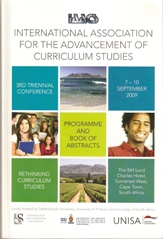|
Tony Mays reflects on the recent International Association
for the Advancement of Curriculum Studies (IAACS) conference
Background
The third triennial conference of the international Association
for the Advancement of Curriculum Studies (IAACS) was held in Somerset-West
in September 2009 and was jointly hosted by the Universities of
Stellenbosch, Pretoria and South Africa.
The theme of the conference was “Rethinking Curriculum Studies”.
The sub-themes were:
- Chaos, complexity and curriculum
- Culturally/gender inclusive curricula
- Curriculum and community
- Curriculum and pedagogy
- Curriculum and transdisciplinary knowledge
- Curriculum studies in Africa
- Decolonizing curriculum studies
- Policy-makers, stakeholders and influence
- Teachers as curriculum developers
171 papers were accepted for presentation.
Keynote addresses were given by:
- Zhang Hua (President) – Confucius and John Dewey: Some
Implications to the Project on the Internationalization of Curriculum
Studies
- Jonathon Jansen – The Politics of Intimacy
- Catherine Odora-Hoppers – Curriculum, Community and Human
Agency in an Integrated Paradigm Shift: An African Perspective
- William Pinar: The Test Our Generation Must Pass.
This report summarises some of the cross-cutting curriculum issues
that arose during the conference, then moves on to teacher education
issues and ends with the recommendations from the paper presented
by Van Niekerk and Mays.
General issues
The following
issues arose from presentations attended and provide a possible
framework of ‘soundbites’ for or suggest questions that
could inform curriculum practice.
In general, there exists a tension between curriculum for self-empowerment
and transcendence (a preoccupation of the developed West?) and curriculum
for social transformation (a continuing concern for China and Africa?)
– is it possible to address both?
Teacher Education issues
In papers presented on teacher education, the interplay between
identity as a teacher and teaching relationships located in particular
contexts in time and space were foregrounded. This is well-expressed
in a paper presented by J
Barak and R Mansur entitled Being and Becoming a Teacher:
‘Living’ the Curriculum of Teacher Education.
Mäkinen,
Ropo and Yrjäinen supported the central role of identity
formation in teacher development in a paper entitled Narrative
Curriculum as Supporter of Teacher’s Identity Formation and
Pedagogical Thinking Processes.
In their paper entitled Curriculum Development for Teacher Education,
Van Niekerk and Mays pointed to the work of Doll:
What Doll advocates is a change of heart, a realisation
of what it means to be a teacher. According to Doll this refers
to a spiritual dimension of a curriculum where the curriculum
enables a student to gain self-understanding and to script their
own narrative on what it means to be a teacher. It goes beyond
the curriculum as transmission, transaction or transformation
to transcending one’s situation and imagining different
possibilities
and argued for
- a hermeneutic approach to curriculum design
- collaboration through a National Association for Teacher Education.
The fourth triennial conference will take place in Rio De Janiero,
Brazil, in 2012.
| 
